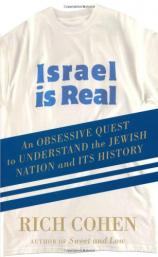Reading Group Guide
Discussion Questions
Israel Is Real: An Obsessive Quest to Understand the Jewish Nation and Its History

1. How did Rich Cohen change your perception of Israel? What historical facts surprised you as you read Israel Is Real? What conventional wisdoms does Cohen overturn?
2. Chapter one describes the first Jewish revolt against the Romans, raising the questions, “Accommodation or war? What if the Zealots had lost this argument? What if the Temple had survived? Would people still speak of ‘the Jewish character’?” Speculate about Rich Cohen’s “what ifs.”
3. Discuss Jonathan ben Zakkai’s school (which, according to lore, was built in a vineyard). What ideas did he preserve, despite the Diaspora? What image of Judaism was “harvested” as a result?
4. The book’s title was inspired by a T-shirt Cohen’s best friend was wearing when he returned from a trip to Tel Aviv in 1977 (described in chapter ten). Beyond political and geographical boundaries, what does the phrase “Israel Is Real” mean throughout the book, from mysticism to the rise of Jewish ghettos?
5. What role have sacred texts played in shaping the idea of Israel? What gives a book --- or an inscribed scroll --- such power?
6. When Cohen describes the conversion of the self-proclaimed messiah Sabbatai Zevi to Islam in the seventeenth century, he captures an event that led to mass apostasy in Constantinople. What is the price of such assimilation? How was Jewish culture affected by the fact that other populations were not forced (or even encouraged) to convert to Judaism in order to survive?
7. Cohen concludes chapter five by stating that the failures of prophecy meant that “if return was ever to be accomplished . . . it would have to wait for secularism, in fact, for engineers and scientists, for Jews who could make their own miracles.” What does this mean for religious Jews? What does it even mean to be a religious Jew in the twenty-first century?
8. A footnote in chapter two presents the analogy of what would happen if America were destroyed and Americans felt compelled to perpetuate the idea of America while in exile. What would that exercise look like for you? What ideals does America stand for? What ideals does Israel stand for?
9. At the end of chapter six, Cohen turns to the story of Jonah to summarize Jewish history in Europe, from the Diaspora and the ghettos to the finality of Hitler’s camps. Discuss the paradox of Jews’ “feeding themselves to the beast” for survival, and returning to history for freedom.
10. What aspects of Jewish identity are represented in the Zionists described by Cohen, from Theodor Herzl to David Ben-Gurion and Moshe Dayan? How would Benjamin Disraeli have fared as Britain’s prime minister if he had served during the fall of the Ottoman Empire? 11. Cohen reiterates the fact that the Holocaust provided the ultimate justification for Israel. In what ways has Israel been, as Cohen puts it, the “happy ending” in a world of anti-Semitism?
12. How did the Six-Day War redefine what it means to support Israel? Is military might the best way to avoid being kept on the margins of society?
13. In contemporary conflicts between Palestinians and Israelis, do both sides have it wrong in any way? How could Cohen’s perception of history foster peace?
14. “No one hates a Jew like a Zionist,” Cohen writes in the last line of his chapter on the new Jew (chapter twelve). What is the impact of stereotypes of Jews, even among Jews (such as Europe’s elite, who funded repatriation of eastern Jews to Palestine to ensure their distance)?
15. How does the storytelling approach in Israel Is Real compare with that of other books you’ve read by Rich Cohen? What makes his approach to research (especially biographical research) unique?
Israel Is Real: An Obsessive Quest to Understand the Jewish Nation and Its History
- Publication Date: July 21, 2009
- Hardcover: 400 pages
- Publisher: Farrar, Straus and Giroux
- ISBN-10: 0374177783
- ISBN-13: 9780374177782







